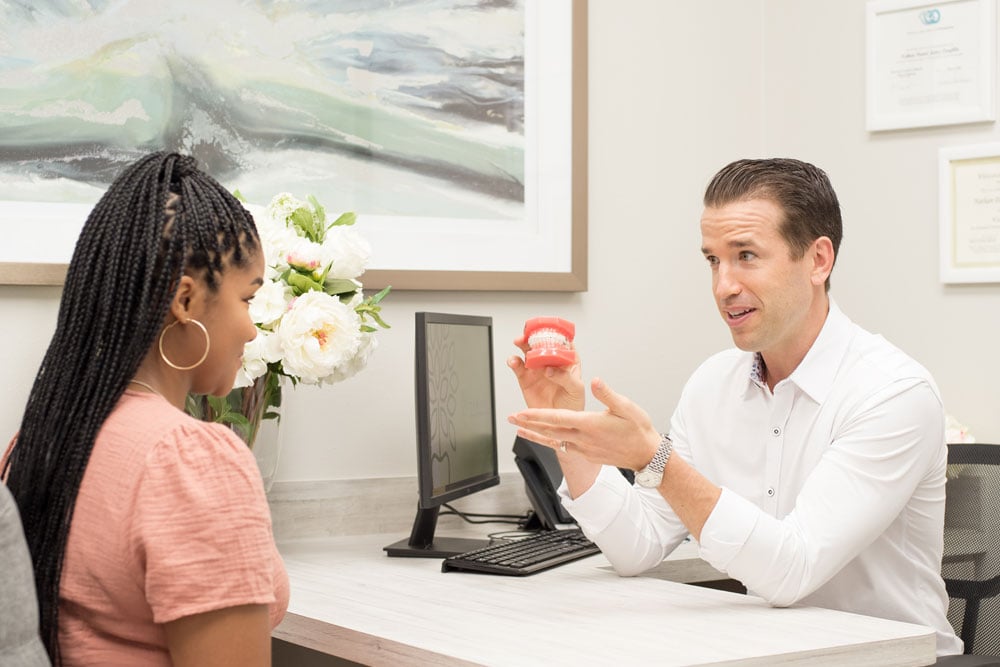Teeth grinding or clenching – aka Bruxism (caused by a combination of physical, psychological, and genetic factors) is extremely prevalent and affects both adults and children alike. And most people have no idea they suffer from this condition because they’re doing it in their sleep! Unfortunately, bruxism often goes undiagnosed for years without proper examination. And the results can be devastating.
The damage caused by teeth grinding
Bruxism can ruin your smile and confidence by making your teeth appear yellow due to dentin (the soft, yellow layer under the enamel) exposure.
It can cause your smile to look aged, uneven, and flat, causing your teeth not to fit together properly.
It can also lead to pain and sensitivity as the hard protective enamel layer is worn down, and the more sensitive parts of your teeth are exposed.
Furthermore, this can lead to cavities, chips, and fractures in your teeth that may need fillings, root canals, or extractions. It can also cause TMJ, Chronic Headaches, and TMJ disorders, leading to jaw pain and difficulty opening and closing your mouth. In some cases, surgery is even needed.
The good news is you can stop or prevent these issues today.
Am I grinding my teeth?
If you’re not sure if you’re grinding your teeth, here are some warning signs to look out for:
- Jaw pain and ache (especially when you wake up in the morning), headaches
- Wear patterns on the biting surfaces of your teeth
- Yellow appearance of your teeth (from the dentin showing through the worn enamel)
- Broken or fractured crowns, fillings, or veneers
- Abfraction – when the enamel starts to sheer off along the gum line – leading to sensitivity and decay as the dentin (the softer second layer of the tooth) is exposed. Knowing what the consequences of bruxism are, I got myself a nightguard ASAP.
The solution to teeth grinding
Besides reducing stress, the easy solution for bruxism is wearing a nightguard at night to protect your teeth and your TMJ from damage.
I know you’re probably thinking there’s no way you’re going to wear one of those bulky mouthguards to sleep. But no need to worry. These days, nightguards can be made with a minimal design that is much more comfortable than the older, bulkier designs.
Nightguards also help protect your investments – such as any cosmetic work like veneers and crowns.
I have to wear my nightguard every night, and I refuse to go to bed without it because I know how important it is for protecting my teeth and jaws.
I recommend a proper custom-fit nightguard made by your dentist rather than a store-bought “boil-and-bite” that isn’t very effective and can worsen the problem.
Come in for an exam so that we can recommend the best solution for your bruxism. If your TMJ issues are more severe, we can refer to you as a TMJ specialist who sees more complex cases.
Conclusion
In summary, some of the most common daily habits we engage in may seem harmless but can irreversibly damage our teeth over time.
So many people suffer from teeth grinding without even knowing it. And this puts you at a higher risk of enamel loss and dentin exposure, which accelerates your teeth’s breakdown even more.
Your teeth are precious. Let’s treat them with the care that will keep them strong and healthy for many years to come.
If you think you might suffer from damaged teeth, teeth grinding, or TMJ problems, we’re here to help. Come in today for a dental exam so we can properly diagnose and provide the best solution for you!



